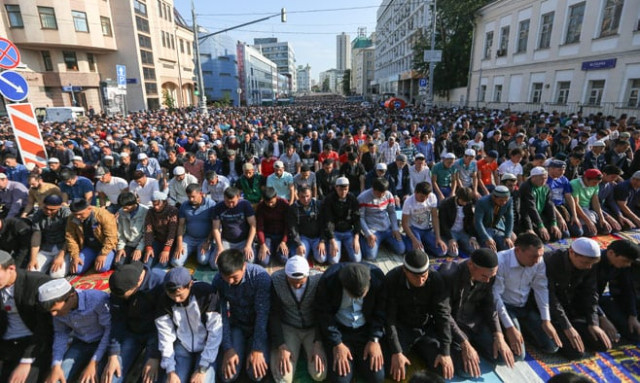One of Europe's biggest mosques to open in Moscow
New mosque will be able to accommodate more than 10,000 people and is built on six floors

PHOTO: Maxim Stulov / Vedomosti
The new mosque, which is built on the site of the city's original mosque, will be able to accommodate more than 10,000 people, about 10 times more than its predecessor, Rushan Abbyasov, deputy chairman of Russia's Council of Muftis said.
Moscow's new mosque is said to be on par with two enormous mosques in Russia's North Caucasus region, the Heart of Chechnya in Grozny and the Grand Mosque in Makhachkala, Dagestan.
Read: Moscow becoming Europe's largest Muslim city
Abbyasov said that with six floors covering a total of 19,000 square metres, the Moscow mosque will be one of the largest in Europe.
But despite its size and the installation of video screens to broadcast prayers, given that the number of Muslims living in Moscow is estimated at around 2 million people, the expansion will not solve the issue of a lack of places of worship for Muslims in the Russian capital.
"The opening of the mosque will only slightly improve the situation during [religious] holidays," Abbyasov said. "They pray in winter, in the cold and in the rain. Believe me, it is really uncomfortable when you have to kneel in a puddle of water."
With only four mosques in the city which is home to more than 10 million residents, it is difficult for all the mosques to accommodate the number of practicing Muslims which stands at about 200,000 people.
Every Muslim holiday sees tens of of thousands of Muslims flood the areas around Moscow's mosques, praying on roads and sidewalks and hindering access for pedestrians and motorists for hours.
Putin, together with Turkish President Recep Erdogan and Palestine's leader Mahmoud Abbas are also expected to be in attendance of the opening ceremony.
Read: Red Juma Mosque opens after 90 years in Russia
During the Soviet era, Moscow's original mosque was the only functioning Muslim place of worship. Reconstruction work began in May 2005, but in 2011 the old building was completely demolished.
The construction of the new mosque cost about $170 million, it was revealed and was funded entirely by private donations from around the world.
The biggest donation was made by Dagestan-born billionaire Suleiman Kerimov, who gave $100 million to the project after barely surviving a car crash in France in 2007.
There may be further plans for building new mosques around the city although recent polls showed that 51 per cent of Muscovites are against the building of new mosques in the city.
This article originally appeared on The Moscow Times



















COMMENTS
Comments are moderated and generally will be posted if they are on-topic and not abusive.
For more information, please see our Comments FAQ